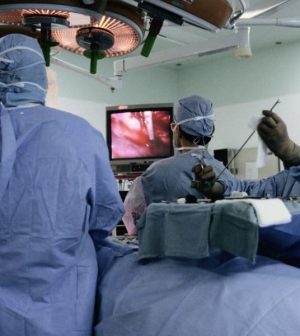- Could Your Grocery Store Meat Be Causing Recurring UTIs?
- Are You Making This Expensive Thermostat Error This Winter?
- Recognizing the Signs of Hypothyroidism
- 10 Strategies to Overcome Insomnia
- Could Artificial Sweeteners Be Aging the Brain Faster?
- Techniques for Soothing Your Nervous System
- Does the Water in Your House Smell Funny? Here’s Why
- Can a Daily Dose of Apple Cider Vinegar Actually Aid Weight Loss?
- 6 Health Beverages That Can Actually Spike Your Blood Sugar
- Treatment Options for Social Anxiety Disorder
Discharge Day Won’t Affect Heart Surgery Outcome: Study

Contrary to popular belief, heart surgery patients who leave the hospital on a weekend or holiday do not have a higher risk for readmission, a new study finds.
Some studies have reported the readmission rate after major heart surgery is as high as 22 percent.
Researchers from the University of California, Los Angeles looked at approximately 4,900 heart surgery patients discharged from the Ronald Reagan UCLA Medical Center between 2008 and 2016. Nearly 20 percent left the hospital on a weekend or holiday.
“We were surprised to find that patients discharged on weekends and holidays had similar readmission rates and outcomes as patients who were cleared on weekdays,” said co-author Dr. Peyman Benharash, a heart surgeon at UCLA.
“Prior planning was likely a critical aspect of successful weekend and holiday discharges at our institution,” he added.
Use of beta blockers before surgery, tobacco use and surgical site infections were predictors of rehospitalization, but day of discharge was not, the researchers found.
In all, 11.4 percent of heart surgery patients discharged on weekdays and 10.9 percent of those who left the hospital on weekends and holidays were readmitted within 30 days, according to the study.
The findings were published online Oct. 11 in The Annals of Thoracic Surgery.
Reagan UCLA Medical Center said it took several steps in 2010 to reduce readmission rates.
As part of that program, patients receive detailed medication instructions and discharge kits equipped with wireless blood pressure monitors, blood oxygen meters, weight scales and miniature electrocardiogram sensors synced to a mobile tablet device.
The mobile app prompts patients to take daily measurements. Results are reported to hospital staff if they are outside normal ranges, allowing for quick intervention.
Patients also receive routine follow-up phone calls for four weeks.
“No individual component will significantly alter patient outcomes. Rather, a synergy of patient empowerment and access to outpatient counseling and care will allow for alleviation of patient anxiety and early recognition of complications should they arise,” Benharash said in a journal news release.
More information
The U.S. National Heart, Lung, and Blood Institute has more on heart surgery.
Source: HealthDay
Copyright © 2026 HealthDay. All rights reserved.










